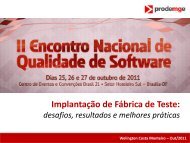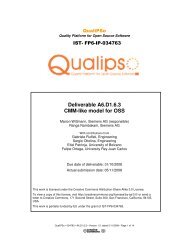WWW/Internet - Portal do Software Público Brasileiro
WWW/Internet - Portal do Software Público Brasileiro
WWW/Internet - Portal do Software Público Brasileiro
You also want an ePaper? Increase the reach of your titles
YUMPU automatically turns print PDFs into web optimized ePapers that Google loves.
ISBN: 978-972-8939-25-0 © 2010 IADISThe field that covers the definition and building process of ontologies in general is described by the termontology engineering. In the context of ontology engineering numerous metho<strong>do</strong>logies and processes that actas modeling guidelines for ontology development have been described (see section 2.1). However, as most ofthe E-Government initiatives that cover the utilization of semantic technologies are rather in an early stage ofintegration into a productive environment and not focused on deployment of ontologies and semanticallyenriched E-Government applications on a large scale, relevant <strong>do</strong>main ontologies tend to be built on an adhoc basis rather than by following a well-defined engineering process.Even if there are quite a lot of metho<strong>do</strong>logies for the ontology engineering process available it isinteresting to observe, that most of these metho<strong>do</strong>logies emerged before the announcement of Tim BernersLee's famous vision of the Semantic Web [17]. Consequently, most of these metho<strong>do</strong>logies aren't preparedfor the decentralized nature of current information and knowledge management systems. Only DILIGENT[4] and HCOME [19] face this paradigm shift to decentralized systems. The nature of the publicadministration sector with its diversity in local laws and regulations isn't tackled by any of thesemetho<strong>do</strong>logies, anyway. Legislation and law is a crucial part in ontology engineering for publicadministration, though.Most of the metho<strong>do</strong>logies described in 2.1 identify the <strong>do</strong>main expert and ontology engineer as twoessential roles in the process of ontology engineering. The ontology engineer, mostly with softwareengineering background, thereby makes (implicitly or explicitly) use of knowledge elicitation methods inorder to acquire expert knowledge for a specific <strong>do</strong>main from the <strong>do</strong>main expert. This should enable theontology engineer to model a specific <strong>do</strong>main. In many cases the process of knowledge elicitation is quitecomplex. As a consequence it is inevitable that some knowledge is lost or some information is misinterpretedduring this process. Therefore, an ontology engineering metho<strong>do</strong>logy should empower the <strong>do</strong>main-experthimself/herself to model a specific <strong>do</strong>main. Most of the existing metho<strong>do</strong>logies, except in parts byDILIGENT [4] and HCOME [19], <strong>do</strong>n't include any attempts towards this goal. Besides the aspect ofknowledge-loss in the knowledge elicitation process also cost saving is an argument because classicalontology engineers are mostly not employed in the public agencies but in external software or knowledgeengineering companies. Thus, a lot of research is required in this field, which should also be addressed bythis thesis.As [18] points out, in ontology engineering for the public administration sector, legislation andenforcement of law on national, regional or local levels need to be incorporated and a variety of different“competent authorities” has to be involved. In many cases constraints probably might have to be weaklyencoded, accompanied by textual explanations and links to further information and supporting bodies. This isnecessary to reflect the special demands of a legal system and to safeguard legal certainty. Another aspecttackled by [18] is that, since law is complex, involved authorities are numerous and as expert knowledge isusually dispersed over the involved authorities, it is simply not possible to develop and maintain all relevantinformation at one central point.As pointed out in [21] the last few years have seen a growing body of research and practice in the field ofartificial intelligence and law for what concerns the construction of legal ontologies and their application tothe law <strong>do</strong>main. However, existing ontologies vary significantly, concerning their underlying structure an<strong>do</strong>rganization, the way they are constructed and how they are exploited in different applications [20]. Onemajor problem thereby is that different authors mean different things by the term ontology itself. As aconsequence the ontologies vary significantly in the way they are represented. These differences aresignificant in that they make it hard to compare different ontologies – “like the proverbial comparison ofapples and pears” [20]. Another aspect from [20] is that ontological choices are strongly influenced by thepurpose of the ontology. That is, the same knowledge will be structured or formalized differently dependingon how it will be used by the reasoner in reaching the desired conclusions in a specific context. This indicatesthat reusability is a good idea, but it can never be accomplished completely according to [20].Generally speaking, the two research disciplines “AI and law” and E-Government are closely related toeach other. What can be observed, though, is the fact that those two disciplines very rarely use results fromthe other discipline. Using results of AI and law in generating intelligent E-Government applications and viceversa brings a lot of potential and should be intensively promoted.Concluding to this section, the desire and need for an ontology engineering metho<strong>do</strong>logy in the context ofpublic administration, as proposed with this thesis, is obvious. The planned research focus and researchquestions are further explained in section 3.422




